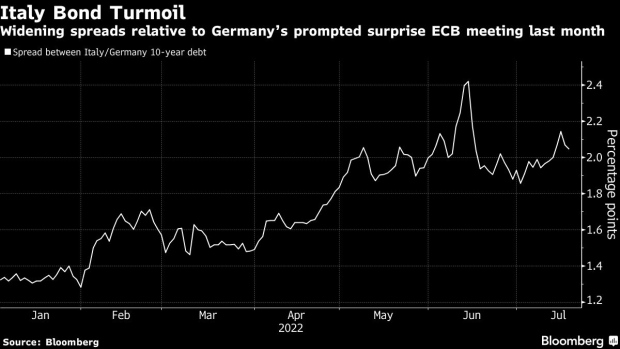Jul 19, 2022
Lagarde Redoubles ECB Push on Bond Tool to Reach Deal This Week
, Bloomberg News

(Bloomberg) -- European Central Bank President Christine Lagarde is redoubling efforts to forge agreement on a still-incomplete new crisis tool, people familiar with the matter said.
Two days before Thursday’s decision, policy makers still have work to do to reach a deal on a measure that can stem market speculation on weaker euro-zone members, said the people, declining to be identified because discussions are private.
Officials are debating the instrument alongside the question of whether to effectively discard prior guidance for a quarter-point interest-rate hike and deliver double that size. A bigger increase may be part of the give-and-take in negotiations over the crisis tool.
Alongside lingering legal concerns, outstanding issues include conditions countries benefiting from ECB bond purchases would need to meet, the people said. They may include sound fiscal policy, with some officials insisting on involving the European Commission, the European Stability Mechanism or both to avoid being the only judge, they said.
An ECB spokesperson declined to comment, citing the quiet period before this week’s policy meeting.
The lack of agreement on the so-called Transmission Protection Mechanism, to use its working title, may leave Lagarde with only a fudged outcome to unveil for now. That could come with the prospect of a more drawn-out process of decision-making to fully complete the creation of a credible measure.
The risk of such a result is that it could invite another bout of financial-market speculation on the ECB’s determination to defend the integrity of the euro, which recently slipped to parity with the dollar for the first time in two decades.
The lack of an announcement about a crisis instrument in June, combined with global turmoil at the heightened speed of US inflation, prompted Lagarde to call an emergency meeting where she extracted a promise from colleagues that such a tool would be created.
Bundesbank President Joachim Nagel has laid out a framework of strict limits that he sees as necessary for any accord. His concern is that ECB bond purchases focused on one country may breach the central bank’s prohibition on financing governments.
Any new instrument is likely to face the gauntlet of a legal challenges leading to scrutiny by Germany’s constitutional court.
Policy makers have signaled in recent weeks that the strings attached won’t be as strict as purchases under former President Mario Draghi’s 2012 OMT program, which requires a bailout from the European Union’s rescue fund.
Another detail being discussed is how long the ECB will hold bonds it buys, the people said. While previous programs specifically allow the central bank to sell assets if they’re no longer needed, policy makers have never actively done that so far.
Governing Council Francois Villeroy de Galhau said this month that the ECB should have the option to part with bonds before they mature.
©2022 Bloomberg L.P.





